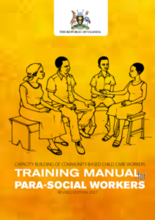This manual is intended to train Para-social workers who are a non-formal “workforce” that constitute the largest but yet undefined group of caregivers who provide support and services to vulnerable children and families, particularly in low and middle income countries (GSSA, 2016). These include religious and traditional leaders, community-based support groups (e.g., mothers’ clubs), Popular Opinion Leaders and Peer Champions; as well as community health workers who can be trained in child protection and welfare knowledge and skills.
The Para-Social Workers’ Training Manual is intended to guide frontline community development workers, including Community Development Officers (CDOs), Probation and Social Welfare Officers (PSWOs) and NGO workers involved in child welfare and protection work. These professionals should be able to conduct a participatory and experiential training and learning process with community-based child care workers that will empower participants to realize the following outcomes: • Understand and appreciate broader human rights and protection, health and psychosocial issues as part of common community problems affecting children and their households.
• Understand HIV and AIDS, and its impact on children, families and communities as well as identify children’s needs in the context of HIV and AIDS, with the view to organize care and support services for them and for their caregivers.
• Gain understanding and skills to support parents and caregivers to strengthen their relationship with children.
• Gain basic skills and techniques to monitor, identify, support, refer and follow up child protection and welfare cases.
• Gain soft skills that are relevant in career building and case management.
• Apply the child protection framework for the prevention of and response to child rights violation cases.
• Demonstrate the ability to document, analyse and utilize data from community-based work with children and their households.
However, if the para-social workers are to be effective in executing their work, they need to have some level of literacy in order to do both the case identification, some kind of assessment and documentation functions. It is expected that people to be trained using this manual have basic educational qualification of ordinary level (lower secondary education) or its equivalent, possess some level of experience in terms of community engagement and previous training in related fields. In addition, the individuals will be required to demonstrate the ability to make some judgements about needs, resources and services available in their communities.
It is expected that, to be able to use this manual effectively, this cadre of professionals training Parasocial workers should have completed the training of trainers’ (ToT) course, so that they can apply the principles and methodology of the training appropriately.

